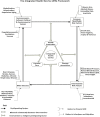The integrated health service model: the approach to restrain the vicious cycle to chronic diseases
- PMID: 31151451
- PMCID: PMC6544908
- DOI: 10.1186/s12913-019-4179-x
The integrated health service model: the approach to restrain the vicious cycle to chronic diseases
Abstract
Background: In life time, nearly each person succumbs to some sort of chronic disease and many develop complicated chronic diseases. It is critical to focus on preventive services with a relatively high health impact and favorable cost effectiveness. During routine health facility visits, it is advisable to evaluate both symptomatic and asymptomatic patients for their needs of health promotion and disease prevention services. This necessitates the development of an integrated health service (IHS) approach that incorporates health promotion, disease prevention and curative services.
Methods: There were two phases for the study. The first phase explored the degree of promotive and preventive health care delivery at the health centers and hospitals. Phase two, utilizing the Delphi strategy, centered on looking for agreement on the finding from phase 1 and on IHS approach. Delphi questions were created based on the results of phase 1, and the reply choices were tied to a five point Likert scale. Consensus was considered come to when 75% of the experts concurred on an issue. From that point, advance clarification and agreement was looked for by implies of a second-round assessment for scores between 50 and 75%. Agreement on proposed IHS model, application of case finding and Periodic Health Examination (PHE) approaches were also sought. This study focuses on finding from phase 2.
Result: Of the twenty experts, 90% (n = 18) agreed that the IHS framework shows the causal relationship of diseases and included plausible intervention approaches. Experts reached consensus (90%;n = 18) that case finding testing,screening patients for conditions other than the medical care they sought at a particular time, can be performed at health facilities. All experts (100%; n = 20) recommended conducting periodic health examinations in selected diseases for patients who are apparently not sick.
Conclusion: The Integrated Health Service (IHS) framework was agreed by experts to be a plausible method in describing the causal relationship of chronic non-communicable, communicable, and nutrition-related diseases. The framework can play a vital role by preventing the acquiring, progression, suffering or dying from diseases through restraining the vicious cycle of chronic diseases.
Keywords: Chronic non-communicable diseases; Disease prevention; Health promotion; Integrated health service.
Conflict of interest statement
The authors declare that they have no competing interests.
Figures
Similar articles
-
Integrating promotive, preventive, and curative health care services at hospitals and health centers in Addis Ababa, Ethiopia.J Multidiscip Healthc. 2019 Apr 5;12:243-255. doi: 10.2147/JMDH.S193370. eCollection 2019. J Multidiscip Healthc. 2019. PMID: 31040687 Free PMC article.
-
From HIV prevention to non-communicable disease health promotion efforts in sub-Saharan Africa: A Narrative Review.AIDS. 2018 Jul 1;32 Suppl 1:S63-S73. doi: 10.1097/QAD.0000000000001879. AIDS. 2018. PMID: 29952792
-
[Study on the effectiveness of implementation: the National Demonstration Areas for Comprehensive Prevention and Control of Non-communicable Diseases].Zhonghua Liu Xing Bing Xue Za Zhi. 2018 Apr 10;39(4):394-400. doi: 10.3760/cma.j.issn.0254-6450.2018.04.002. Zhonghua Liu Xing Bing Xue Za Zhi. 2018. PMID: 29699025 Chinese.
-
A Policy Analysis on the Proactive Prevention of Chronic Disease: Learnings from the Initial Implementation of Integrated Measurement for Early Detection (MIDO).Int J Health Policy Manag. 2017 Jun 1;6(6):339-344. doi: 10.15171/ijhpm.2017.18. Int J Health Policy Manag. 2017. PMID: 28812826 Free PMC article.
-
An Integrated Framework For The Prevention And Treatment Of Obesity And Its Related Chronic Diseases.Health Aff (Millwood). 2015 Sep;34(9):1456-63. doi: 10.1377/hlthaff.2015.0371. Health Aff (Millwood). 2015. PMID: 26355046 Review.
Cited by
-
Scientific, professional and experiential validation of the model of preventive behaviours at work: protocol of a modified Delphi Study.BMJ Open. 2020 Sep 13;10(9):e035606. doi: 10.1136/bmjopen-2019-035606. BMJ Open. 2020. PMID: 32928848 Free PMC article.
-
Selection of Policy Instruments on Integrated Care in China: Based on Documents Content Analysis.Int J Environ Res Public Health. 2020 Mar 30;17(7):2327. doi: 10.3390/ijerph17072327. Int J Environ Res Public Health. 2020. PMID: 32235602 Free PMC article.
-
The Impact of COVID-19 on Cancer Screening: Challenges and Opportunities.JMIR Cancer. 2020 Oct 29;6(2):e21697. doi: 10.2196/21697. JMIR Cancer. 2020. PMID: 33027039 Free PMC article.
-
Attitudes of People With Chronic Musculoskeletal Disorders Towards Telerehabilitation: A Cross-Sectional Survey.Cureus. 2025 Jun 30;17(6):e87012. doi: 10.7759/cureus.87012. eCollection 2025 Jun. Cureus. 2025. PMID: 40741549 Free PMC article.
References
-
- Lopez AD, Mathers CD, Ezzati M, Jamison DT, Murray CJL. Measuring the global burden of disease and risk factors, 1990–2001. New York: Oxford University Press; 2006. - PubMed
-
- Matheson GO, Klügl M, Engerbretson L, Bendiksen F, Blair SN, Börjesson M, Budgett R, Derman W, Erdener U, Ionnidis JPA, Khan KM, Martinez R, van Mechelen W, Mountjoy M, Sallis RE, Schwellnus M, Schultz R, Soligard T, Steffen K, Sundberg CJ, Weller R, Lungqvist A. Prevention and management of non-communicable disease: the IOC consensus statement, Lausanne 2013. Br J Sports Med. 2013;47:1003–1011. doi: 10.1136/bjsports-2013-093034. - DOI - PubMed
-
- Institute for Clinical Systems Improvement (ICSI) Health care guideline: preventive services for adults. 17. Bloomington, MN: ICSI; 2011.
-
- Fletcher RH, Fletcher SW, Fletcher GS. Clinical epidemiology: the essentials. 5. Baltimore, MD: Lippincott Williams & Wilkins; 2014.
MeSH terms
LinkOut - more resources
Full Text Sources
Molecular Biology Databases


